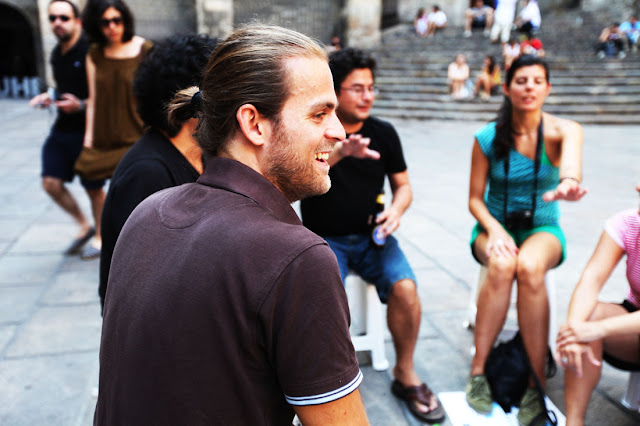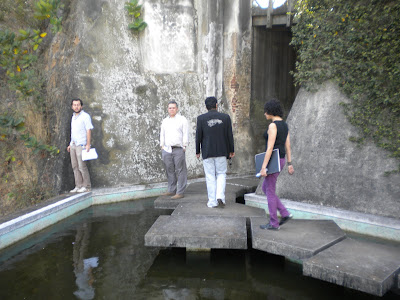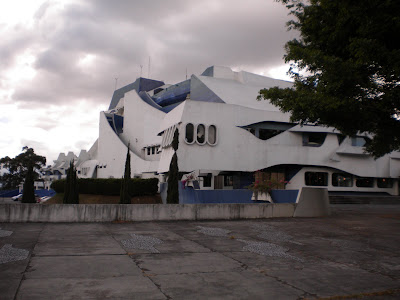Escuela de Calor, referencia al titulo de la cancion de Radio Futura, a la letra,( arde la calle al sol del poniente..) continuando con la postura de buscar y re-interpretar a varios "maestros" grecolatinos desde Diogenes, Socrates, Aristoteles a Joseph Jacotot o Jaques Ranciere.....
La propuesta para el festival de arquitectura Eme3, Escuela de Calor, surge de la idea de país y contexto caluroso y ardiente, de inter-zona donde quizás (como en muchas ocasiones hemos escuchado) el calor anulaba las ganas de aprender, de acudir a la escuela y por supuesto de trabajar y aplicar lo supuestamente aprendido.
Quien no ha oído mil veces hablar de los perezosos e inútiles Latinos??
Quien no ha oído mil veces hablar de los perezosos e inútiles Latinos??
Nuestra vagancia proverbial conocida en todo el mundo desde donde se impone la moral protestante,amante del trabajo que viene de los países fríos...
Una Escuela de Calor desde donde a nuestro ritmo y de paseo, sentados a una fresca terraza precariamente improvisada, retomando el espacio para nosotros en un gesto pequeño pero radical y con cervezas bien frias, nos encontramos para debatir temas muy Calientes, por lo tanto la idea de conspirar aparentando retozar, sobre las aberraciones Urbanisticas y Arquitectonicas,sobre las malas practicas y la Corrupción y sobre la necesidad de estudiar esos temas con nuevas luces y estadisticas.
Como hilo conductor se habla del texto de Martha Rosler publicado en E-Flux :
(Indeed, the very concept of “daily life” is itself a product of industrialism and the urban.) Martha Rosler.
////////////////////Calor en eme3 : An extract cut and paste fragments from Martha Rosler essay published at E-Flux Journal //////Culture Class: Art, Creativity, Urbanism, Part 1 E-Flux Journal http://www.e-flux.com/journal/view/190///////////////////////////////////////////////////////////////////////////////////////////////////////////
Una Escuela de Calor desde donde a nuestro ritmo y de paseo, sentados a una fresca terraza precariamente improvisada, retomando el espacio para nosotros en un gesto pequeño pero radical y con cervezas bien frias, nos encontramos para debatir temas muy Calientes, por lo tanto la idea de conspirar aparentando retozar, sobre las aberraciones Urbanisticas y Arquitectonicas,sobre las malas practicas y la Corrupción y sobre la necesidad de estudiar esos temas con nuevas luces y estadisticas.
Como hilo conductor se habla del texto de Martha Rosler publicado en E-Flux :
////////////////////Calor en eme3 : An extract cut and paste fragments from Martha Rosler essay published at E-Flux Journal //////Culture Class: Art, Creativity, Urbanism, Part 1 E-Flux Journal http://www.e-flux.com/journal/view/190///////////////////////////////////////////////////////////////////////////////////////////////////////////
We will leave Monsieur Le Corbusier’s style to him, a style suitable for factories and hospitals, and no doubt eventually for prisons. (Doesn’t he already build churches?) Some sort of psychological repression dominates this individual—whose face is as ugly as his conceptions of the world—such that he wants to squash people under ignoble masses of reinforced concrete, a noble material that should rather be used to enable an aerial articulation of space that could surpass the flamboyant Gothic style. His cretinizing influence is immense. A Le Corbusier model is the only image that arouses in me the idea of immediate suicide. He is destroying the last remnants of joy. And of love, passion, freedom.
—Ivan Chetcheglov9
Perhaps it is the primacy of the spatial register, with its emphasis on visuality, but also its turn to virtuality, to representation, that also accounts for architecture’s return to prominence in the imaginary of the arts, displacing not only music but architecture’s spectral double, the cinema. This change in the conduct of everyday life, and the centrality of the city to such changes, were apparent to the Situationists, and Debord’s concept of what he termed “the society of the spectacle” is larger than any particular instances of architecture or real estate, and certainly larger than questions of cinema or television. Debord’s “spectacle” denotes the all-encompassing, controlling nature of modern industrial and “post-industrial” culture. Thus, Debord defines the spectacle not in terms of representation alone but also in terms of the social relations of capitalism and its ability to subsume all into representation: “The spectacle is not a collection of images; rather, it is a social relationship between people that is mediated by images.”10 Elements of culture were in the forefront, but the focus was quite properly on the dominant mode of production.The Situationists’ engagement with city life included a practice they called the dérive. The dérive, an exploration of urban neighborhoods, a version of the nineteenth-century tradition of the flâneur, and an inversion of the bourgeois promenade of the boulevards (concerned as the latter was with visibility to others, while the flâneur’s was directed toward his own experience), hinged on the relatively free flow of organic life in the neighborhoods, a freedom from bureaucratic control, that dynamic element of life also powerfully detailed by Lefebvre and Jane Jacobs. Both Baudelaire and Benjamin gave the flâneur prominence, and by the end of the twentieth century the flâneur was adopted as a favored, if minor, figure for architects wishing to add pedestrian cachet to projects such as shopping malls that mimic public plazas—thus closing the book on the unadministered spaces that the Situationists, at least, were concerned with defending.
Quizá sea la primacía del registro espacial, con su énfasis en la visualidad, pero también su giro hacia la virtualidad, hacia la representación, lo que también da cuenta del retorno de la arquitectura a la prominencia en el imaginario de las artes, desplazando no sólo a la música sino al doble espectral de la arquitectura, el cine. Este cambio en la conducta de la vida cotidiana, y de la centralidad de la ciudad hacia dichos cambios, fue aparente para los Situacionistas, y el concepto de Debord de lo que denominaba “la sociedad del espectáculo” es mayor que cualquier instancia particular de la arquitectura o de las bienes raíces, y ciertamente mayor que las cuestiones relativas al cine o la televisión. El “espectáculo” de Debord denota esa naturaleza abarcadora de la cultura industrial moderna y “post-industrial.” Por lo tanto, Debord define al espectáculo no en cuanto a su representación por sí sola, sino también en cuanto a las relaciones sociales del capitalismo y su habilidad para subsumirlo todo en la representación: “El espectáculo no es una colección de imágenes; más bien, es una relación social entre personas mediadas por las imágenes.” Los elementos de la cultura estaban al frente, pero el enfoque estaba bastante apropiadamente del lado dominante de la producción.
Lefebvre’s emphasis on the city contradicted the orderliness of Le Corbusier, whom he charged with having failed to recognize that the street is the site of a living disorder, a place, in his words, to play and learn; it is a site of “the informative function, the symbolic function, the ludic function.”5 Lefebvre cites the observations of the foundational urban observer Jane Jacobs, and identifies the street itself, with its bustle and life, as the only security against violence and criminality. Finally, Lefebvre notes—soon after the events and discourses of May ‘68 in France—that revolution takes place in the street, creating a new order out of disorder.
El énfasis de Lefebvre contradijo la correctitud de Le Corbusier, a quien criticó por no haber logrado reconocer que la calle es el sitio de un desorden vivo, un lugar, en sus palabras, para jugar y aprender; es un sitio de “la función informativa, la función simbólica, la función lúdica.” Lefebvre cita las observaciones del observador urbano fundacional Jane Jacobs, e identifica a las calles, con su bullicio y su vida, como la única seguridad contra la violencia y la criminalidad. Finalmente, Lefebvre señala –poco después de los eventos y discursos del mayo del 68 en Francia—que la revolución toma lugar en las calles, creando un nuevo orden a partir del desorden.
The theoretical underpinning for a renovated cityscape came primarily from the earlier, utopian “millennial” and interwar designs of forward-looking, albeit totalizing, plans for remaking the built environment. It was not lost on the city poor that so-called urban renewal projects targeted their neighborhoods and the cultural traditions that enlivened them. Cities were being remade for the benefit of the middle and upper classes, and the destruction of the older neighborhoods—whether in the interest of commercial, civic, or other forces, such as enhanced mobility for trucks and private cars—extirpated the haunts of those beyond the reach of law and bourgeois proclivities, adversely affecting the lives and culture of the poorer residents. Martha Rosler, Culture Class: Art, Creativity, Urbanism, Part 1 E-Flux Journal http://www.e-flux.com/journal/view/190
El fundamento teórico para el paisaje urbano renovado surgió primordialmente de diseños anteriores, utópicos “milenarios” y de entre guerras, para planes avanzados aunque totalizantes, para la reelaborar el entorno construido. No se tomó desapercibido por los pobres de las ciudades que los llamados proyectos de renovación urbana tenían como blanco a sus propios barrios y las tradiciones culturales que las mantenían vivas. Las ciudades estaban siendo reelaboradas para beneficio de las clases media y alta, y la destrucción de los viejos barrios –ya sea por intereses comerciales, cívicos o de otras fuerzas, tales como el estímulo a la movilidad para camiones y autos privados—extirpó las moradas de aquellos que estaban más allá del alcance de la ley y las proclividades burguesas, afectando adversamente las vidas y cultura de los residentes más pobres.http://artecontempo.blogspot.com/search?updated-max=2011-06-11T22%3A32%3A00-07%3A00&max-results=1











































